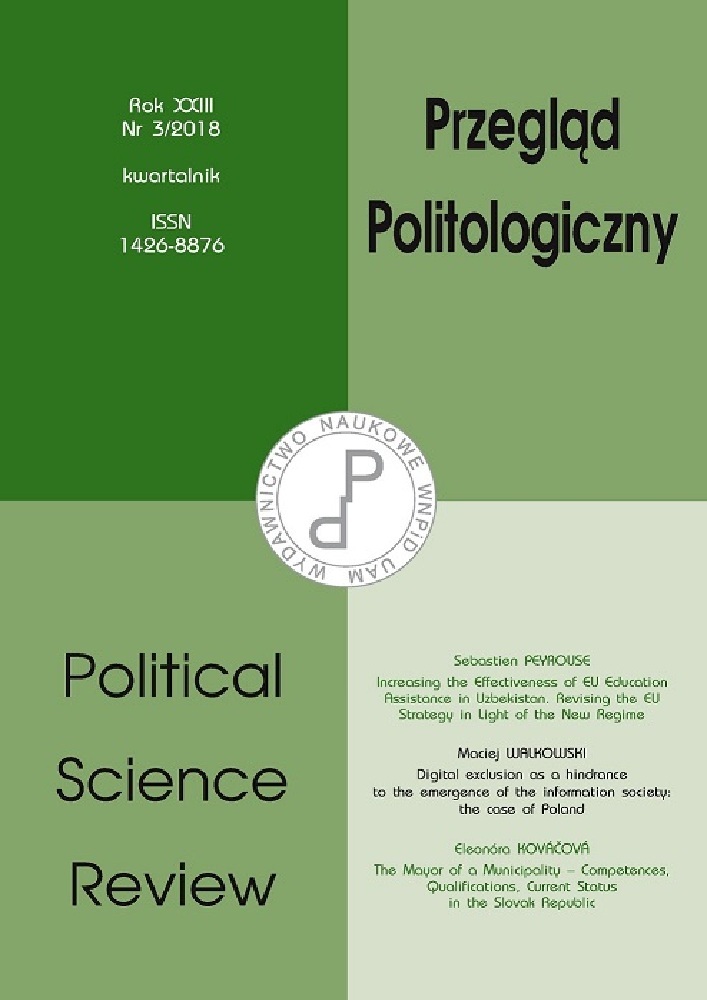Abstrakt
The progress of civilization, supported by the development of new technologies, has led to a series of social, economic and political changes. The information society, in its expectations and through access to knowledge, has significantly affected a change in the model of democracy, causing a kind of return to the original forms of communication in citizen-government relations. This has been accompanied by a shift of social and civic activism from the real to the virtual world. In literature, the use of information and communication technologies in the democratic system is named electronic democracy. One of its forms is e-politics, which is implemented at several levels: institutional, system and civil. A good example of the last type are the new social movements that in recent years have had a significant impact on politics. The basic research problem in this paper concerns e-politics from the citizens’ perspective, through the activities of the new social movements, especially of a political nature. The main research goal is therefore to present the role of social networking tools in influencing citizens and their subsequent activities that have triggered changes in the political system. The methods used in the paper are case study and comparative analysis.
Bibliografia
Armbruster J. (2012), Arabska wiosna. Rewolucja w świecie islamskim, transl. R. Kędzierski, Wydawnictwo Dolnośląskie, Wrocław.
Castells M. (2008), Społeczeństwo sieci, Wydawnictwo Naukowe PWN, Warszawa.
Choi J. W. (2006), Deliberative Democracy, Rational Participation and e-Voting in South Korea, “Asian Journal of Political Science,” vol. 14, no. 1.
Davis A. (2009), New Media and Fat Democracy: The Paradox of Online Participation, “New Media & Society,” vol. 12, issue 5.
Dorenda M. (2010), Join The Cause – Obywatelskość na Facebooku, in: Polityczne aspekty nowych mediów, eds. M. Jeziński, A. Seklecka, W. Peszyński, Wydawnictwo Adam Marszałek, Toruń.
Drapeau M. (2009), Government 2.0: From the Goverati Adhocracy to Government with the People, in: State of the eUnion. Government 2.0 and Onwards, eds. J. Gøtze, Ch. B. Pedersen, Author-House, Bloomington.
Dzisiów-Szuszczykiewicz A. (2011), “Arabska wiosna” – przyczyny, przebieg, prognozy, “Bezpieczeństwo Narodowe,” vol. 18.
Fisher J. (2015), Myanmar’s 2015 landmark elections explained, 3.12.2015, bbc.com, http://www.bbc.com/news/world-asia-33547036, 15.03.2016.
Hacker K. L., van Dijk J. (2000), Digital Democracy: Issues of Theory and Practice, Sage Publications, London.
Kobyłka A. (2007), Do czego doprowadzi szafranowa rewolucja?, 28.09.2007, psz.pl, http://www.psz.pl/124-polityka/aleksander-kobylka-do-czego-doprowadzi-szafranowa-rewolucja-komentarz, 18.03.2016.
Lakomy M. (2013), Demokracja 2.0. Interakcja polityczna w nowych mediach, Wydawnictwo WAM, Kraków.
Lakomy M., Porębski L., Szybut N. (2014), Polityka 2.0. Aktorzy polityczni w świecie nowych technologii, Wydawnictwo WAM, Kraków.
Lilleker D. G. (2006), Key Concepts in Political Communication, Sage Publications, London.
Maj P. (2011), Internet jako narzędzie walki w polskiej polityce, in: Nowe media w systemie komunikowania, ed. M. Jeziński, Wydawnictwo Adam Marszałek, Toruń.
Offe C. (1985), New Social Movements: Challenging the Boundaries of Institutional Politics, “Social Research,” vol. 52, no. 4.
Park S. (2010), Inoperative Community in Post-Authoritarian South Korea: Football Fandom, Political Mobilization and Civil Society, “Journal for Cultural Research,” vol. 14, no. 2.
P6_TA(2008)0178, Sytuacja w Birmie. Rezolucja Parlamentu Europejskiego z dnia 24 kwietnia 2008 r. w sprawie sytuacji w Birmie, http://www.europarl.europa.eu/meetdocs/2009_2014/documents/droi/dv/p6_ta(2008)0178_/p6_ta(2008)0178_pl.pdf, 18.03.2016.
Touraine A. (2009), Thinking Differently, transl. D. Macey, Polity Press, Cambridge.
Tufekci Z. (2014), Social movements and governments in the digital age: evaluating a complex landscape, “Journal of International Affairs,” vol. 68, no. 1.

